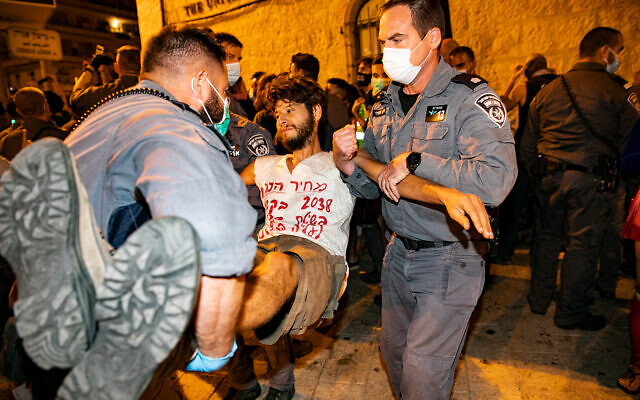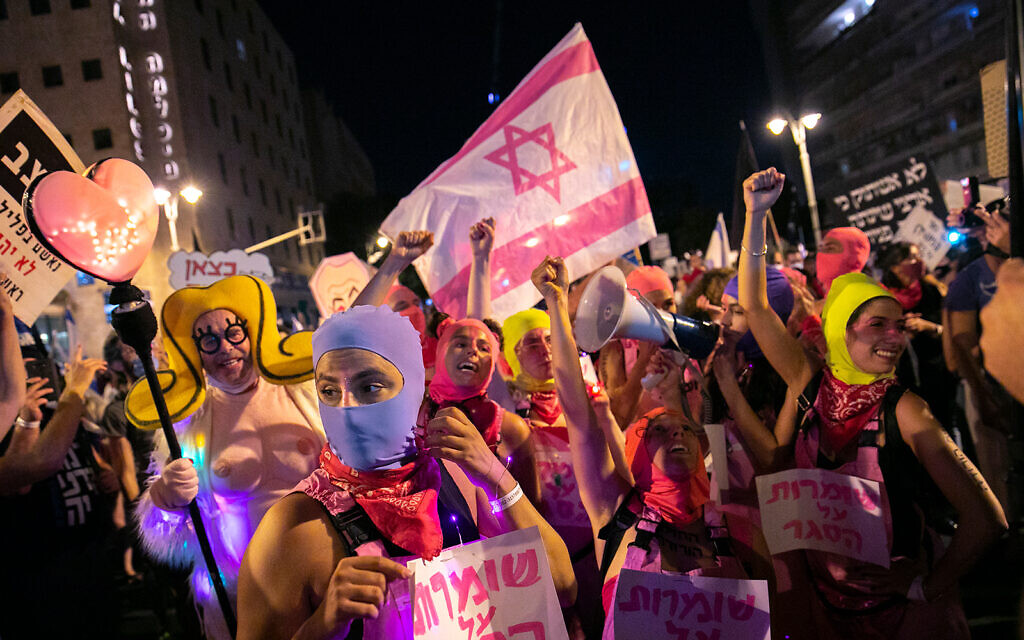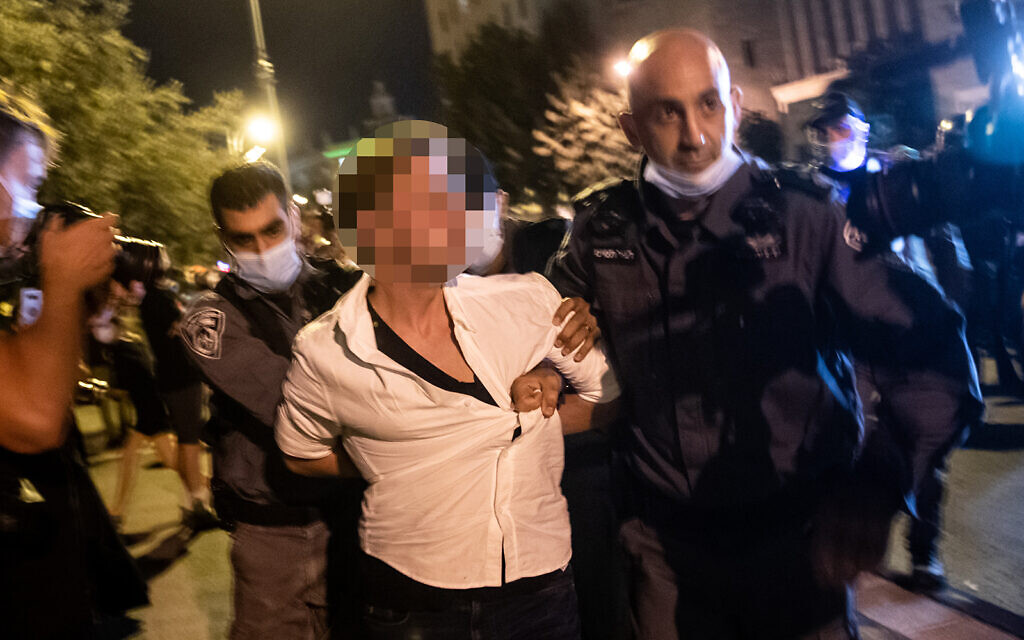Thousands gather outside premier’s Jerusalem residence for weekly demonstration against corruption, government handling of pandemic; 1 detained for speeding car toward barricades

Police arrested 11 anti-government demonstrators in Jerusalem on Sunday night during the first major protest since Israel started its second nationwide lockdown to curb its surging coronavirus outbreak.
Several thousand people gathered for a weekly protest against Prime Minister Benjamin Netanyahu outside his official residence in Jerusalem. Several hundred more protested outside his private residence in the seaside town of Caesarea.
While protests are exempt from the new restrictions on movement, gatherings, and business, which came into force Friday before the Rosh Hashanah holiday, police announced new social distancing guidelines for demonstrations on Friday.
Police said that demonstrators would be required to divide into “capsules” of 20 or fewer people, with social distance within and between the capsules, without specifying how that would happen.
Sunday night’s protest was somewhat smaller than other demonstrations in recent weeks, with considerably more space between demonstrators. Still, despite the lockdown and the holiday, thousands arrived outside Netanyahu’s residence to protest.
“We don’t believe in the lockdown. It harms the country far more than it benefits us. We came to protest specifically for this reason,” said demonstrator Gil Snapir from the central city of Ramat Gan.
Ahead of the rally, police stretched out yellow barricade tape in an attempt to divide the intersection into capsules and enforce social distancing. Police did not physically enforce the measures as the new guidelines are currently just a suggestion and have not yet been approved by the government.
About two hours into the protests, however, the system had already fallen apart. As far as the crowd was concerned, Sunday night’s protest seemed about the same as others in Jerusalem in recent weeks.

Some demonstrators said that they believed that the lockdown had been put into place specifically to prevent further protests against Netanyahu.
“This is a political lockdown,” said veteran activist Eli Brock, “one whose goal is twofold: to end the protests against Netanyahu, and to cause chaos, which the prime minister thrives on.”
Yiftach Yogev, a teacher and resident of Kibbutz Tzuba, told The Times of Israel at the protest that he was concerned about the effects the lockdown would have on his students. He said that some kind of lockdown was necessary, but that the government was failing to manage the crisis in a way that protected ordinary people.
“I work with at-risk youth. It was only when we got back to school now, in the fall, that we saw the blows that the first lockdown had dealt them — the economic pressure on their families, the lack of structure. This time at least schools [for at-risk youth] are running, but it’s unclear how the rest of the situation will affect them,” Yogev said.
Around midnight, the police announced that the gathering had become illegal and demanded that demonstrators leave the area so they could reopen the intersection to traffic. In recent weeks, police have used this as an explanation for breaking up demonstrations and fined those remaining in the middle of the road.
המחאה בבלפור | המשטרה כרזה למפגינים על פתיחת הכביש לתנועה בכיכר פריז, והחלה לבצע מעצרים @SuleimanMas1 pic.twitter.com/ncWW2JuMD9
— כאן חדשות (@kann_news) September 20, 2020
With the lockdown in place limiting travel, however, barely a car could be seen. Protesters began chanting “There are no cars, there are no cars.”
As the night went on, police charged into the crowd at several points to detain demonstrators, shoving protesters aside; in one case, dozens of police officers surrounded and dragged away a woman who refused to leave her position on the sidewalk.
The Times of Israel also saw at least two instances of protesters shoving police officers without apparent provocation. In both cases, other demonstrators rushed to grab the assailants and move them away from the scene.
Hebrew media reported that a protester sprayed a police officer with pepper spray, injuring the officer. The protester was arrested.
Police arrested one man earlier in the night who was speeding toward barricades set up around the protest site. They did not immediately specify whether the incident was a near-accident or an intended attack, but videos from the scene appeared to show the driver slamming his brakes as he approached officers. The driver was a Jerusalem resident in his 20s and was taken by police for questioning.

The Prime Minister’s Residence has become the center of ongoing demonstrations against the premier over his indictment on graft charges and handling of the pandemic, with weekly protests there sometimes drawing tens of thousands of people.
Netanyahu is charged with fraud, breach of trust and accepting bribes in three separate cases. His criminal trial began in June, but he has refused to step down from office and denies any wrongdoing. Many demonstrators also protested against his handling of the coronavirus crisis.
Netanyahu and his supporters have claimed the protests are a major vector of infections, though health officials have said no new infections have been traced back to the rallies so far.
The new lockdown is set to last at least three weeks. Israel, which has one of the highest daily infection rates per capita in the world, became the first developed country to order a second lockdown to fight the pandemic.
Israel’s coronavirus czar warned Sunday that virus numbers were reaching “emergency” levels that could see the country face 600 deaths a month, and ordered hospitals to add new virus wards.
The weekly protests in Jerusalem and elsewhere across Israel are usually held on Saturday evenings after Shabbat, but this week they were pushed off until Sunday night, after the Jewish New Year holiday ended.
Ultra-Orthodox Israelis protested Sunday night against the lockdown restrictions in Jerusalem and Bnei Brak. Police reportedly suspect some ultra-Orthodox said they were attending protests as a ploy to travel between cities after the holiday, exploiting the lockdown allowance for demonstrations.
As reported by The Times of Israel
